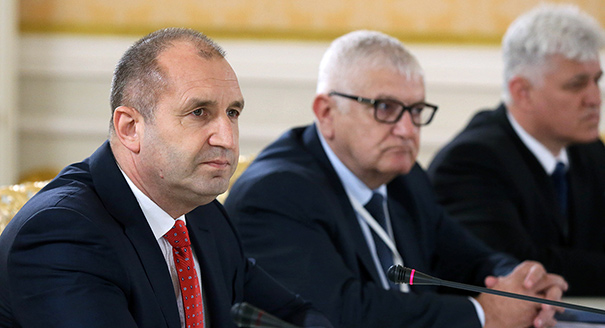Just one week has seen three EU leaders visit Russia: German Chancellor Angela Merkel, French President Emmanuel Macron, and Bulgarian President Rumen Radev. While no one doubts the German and French commitment to European unity, questions abound regarding Bulgaria’s loyalties.
What is the meaning of the first Russo-Bulgarian presidential summit in nearly a decade? Is Russia stepping up its activities in the Balkans? Is it seeking out Europe’s weakest links and hoping to make them switch sides by appealing to historical ties and offering privileged energy agreements? Is Bulgaria once again Russia’s Trojan horse in the EU?
Recent developments in Bulgarian politics point to warming relations between Sofia and Moscow. Rumen Radev, a politician known for his pro-Russian views, replaced Rosen Plevneliev, a staunch Atlanticist, as Bulgarian president in early 2017. Shortly thereafter, parliamentary elections saw Prime Minister Boyko Borisov and his conservative GERB party remain in power while pro-European liberals ceded their positions in the ruling coalition to right-wing nationalists, some of whom even support Russia’s annexation of Crimea.
Bulgaria declined to support Romania’s initiative to permanently station NATO’s fleet in the Black Sea. It also refused to join EU and NATO partners in expelling Russian diplomats following the poisoning of ex-spy Sergei Skripal and his daughter in the UK. Finally, it postponed plans to acquire fighter jets from a NATO partner and resumed negotiations with Moscow concerning a $40 million contract to repair MiG aircraft.
In this atmosphere, some Bulgarian politicians, especially those on the margins, quickly changed their tune. A few years ago, they deemed NATO irreplaceable and Bulgaria’s principal partner. Today, they openly debate exiting the alliance.
Borisov and his party, who have ruled for nearly ten years, are also warming up to Russia. It was Borisov who initiated Bulgaria’s withdrawal from joint projects with Russia upon coming to power in 2009. At the time, he claimed that the projects threatened the environment as well as Bulgaria’s sovereignty. He may yet follow Radev’s example and visit Russia to discuss the same projects he abandoned years before.
Bulgaria’s disappointment with the West lies behind the country’s pivot to Russia. Bulgaria’s society and political elites alike resent the fact that severing ties with Russia in the name of Euro-Atlantic solidarity yielded Bulgaria little dividend. Instead, Sofia had contracts severed, international arbitrations initiated, and fines imposed.
When Borisov’s government refused to continue the construction of Belene Nuclear Power Plant, the project was already in its advanced stage. With U.S. companies uninterested in helping Bulgaria transfer the Russian reactors to the Kozloduy Nuclear Power Plant, the two reactors went nowhere and became a colossal headache for Sofia.
In 2016, Bulgaria paid the 620 million euros it owed Russia for the reactors. Every day that Bulgaria defaulted on its debt cost the country 162,000 euros. Although Bulgaria tried to sell the equipment off to Iran, in the end, the reactors stayed in Bulgaria. No one knows what to do with them: letting them gather dust makes no sense, but building a nuclear power plant single-handedly costs too much money.
Sofia has suggested constructing a pan-Balkan Nuclear Power Plant and tried to find an investor that would not require state guarantees or national subsidies. But the hype generated by Sofia in the lead-up to Radev’s visit to Moscow suggests that the Bulgarians are still contemplating the Russian option. Doing so makes sense given Hungarian Prime Minister Viktor Orbán’s success in securing EU approval for joint Russo-Hungarian expansion of the Paks Nuclear Power Plant. Yet whatever the outcome of the Belene Nuclear Power Plant saga, Sofia is unlikely to forget that it owes much of its losses from the project to the West’s sage advice and vague promises.
Bulgaria found the West’s role in the South Stream affair to be doubly unpalatable. Bulgaria’s withdrawal from the project was one of Borisov’s first moves upon his return to office in the fall of 2014. Brussels strongly favored withdrawal, and Sofia obliged, hoping to receive EU assistance in resolving its gas disputes in exchange.
However, European leaders have not only declined to assist Bulgaria in implementing its Balkan gas hub project but also tolerated the construction of Nord Stream 2 pipeline in Germany. Today, the pro-Russian Radev and the hitherto anti-Russian Borisov both desire Bulgarian participation in Russian gas projects.
Russia is skeptical of Bulgaria’s reliability and the duration of the current thaw in Russo-Bulgarian relations. Yet the Kremlin is pleased to see that Borisov, who not too long ago claimed that Bulgaria had nothing to gain and everything to lose from Russian energy projects, now wants a piece of the pie, if only a small one. But unlike Orbán, Borisov finds himself in a much more delicate position. Sofia cannot be as persistent and crafty in its standoff with Brussels as Budapest was in the Paks Nuclear Power Plant dispute.
Brussels has repeatedly demonstrated that it will not treat Bulgaria with kid gloves and is prepared to exert serious pressure and possibly even freeze EU funds for Sofia. Bulgaria’s opportunistic politicians, who are prone to changing sides frequently, are unlikely to put up a fight under such circumstances.
The question of how close Bulgaria should be to Russia has been at the heart of the Bulgarian foreign policy debate for a century and a half, so the current government is unlikely to offer a decisive answer. In due time, Sofia’s rapprochement with Moscow will raise traditional fears of subjugation by Russia, and new politicians will come forth promising to rescue Bulgaria from humiliating bondage.



.jpg)

